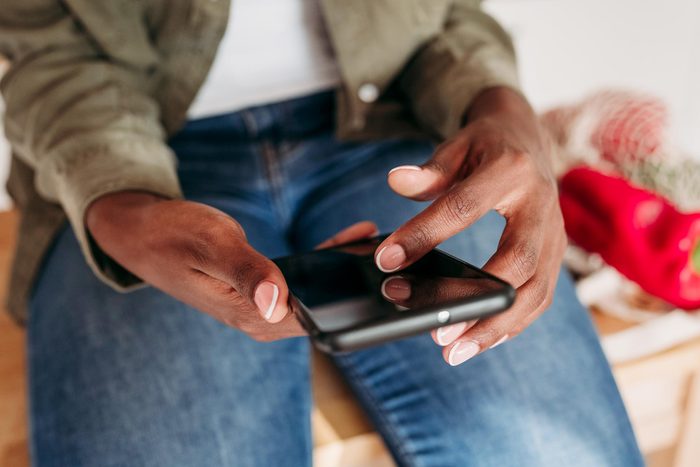Using Your Phone for This Many Hours Daily Causes High Blood Pressure, Says New Study
Updated: Jun. 07, 2023

Is your cell phone ticking up more than just minutes? New research sounds the alarm on a potential correlation between lengthy phone calls and an increase in high blood pressure. It might be time to hang up for the sake of heart health.
In our constantly connected world, cell phones have become an undeniable necessity. However, a recent study published in the European Heart Journal – Digital Health introduces a note of caution to our digital dependency. It suggests a possible link between long mobile phone conversations and a heightened risk of high blood pressure, adding a new perspective to the health implications of our mobile-centric lives.
In a press release for the European Society of Cardiology, author of the study Professor Xianhui Qin of Southern Medical University, Guangzhou, China, says, “It’s the number of minutes people spend talking on a mobile that matter for heart health, with more minutes meaning greater risk.” Interestingly, according to Qin, the duration of your overall mobile phone usage or the use of hands-free devices seems to have no bearing on this risk. Qin emphasizes that further research is crucial to corroborate these findings.
7 Drinks That Lower High Blood Pressure
Hypertension on the line
Known more commonly as high blood pressure, hypertension is a widespread health concern characterized by the persistent high force of blood against the artery walls. When left unchecked, it poses a severe risk, potentially leading to heart disease and stroke—two major causes of death in the U.S.
According to the World Health Organization (WHO), hypertension affects approximately 1.28 billion adults aged between 30 and 79. Nearly half, or 46%, of adults suffering from hypertension are not even aware they have this condition. In light of such statistics, it becomes vital to understand and mitigate contributing risk factors. One such factor might just be in your hand right now—your cell phone.
4 Easy Metrics That Help Gauge Your Heart Health (and That You Can Measure Yourself)
The details
The study drew upon data from the UK Biobank, involving 212,046 adults between 37 to 73 years old, all initially hypertension-free. The research primarily focused on understanding the relationship between making and receiving phone calls and the onset of high blood pressure.
The results were striking after the 12-year observation period: Users experienced a 7% greater risk of developing hypertension than those who didn’t use mobile phones. This risk became even more evident for those spending 30 minutes or more on phone calls each week. These individuals faced a 12% greater risk of high blood pressure than their counterparts who spent less than 30 minutes on phone calls weekly.
A deeper dive into the data showed an escalating trend. As weekly phone call duration increased, so did the risk of hypertension. For instance, participants spending 4-6 hours on phone calls each week were at a 16% higher risk than those spending less than 5 minutes. The risk jumped to 25% for those who spent over 6 hours on phone calls weekly.
This Is the Best Diet for Your Heart, Says New Report
Genetic predisposition and mobile phone calls
One notable aspect of the study was examining how genetic predisposition to hypertension interacts with phone usage. If you possess a high genetic risk for hypertension and spend at least 30 minutes per week talking on your mobile, your chances of developing high blood pressure could be 33% higher than those with a lower genetic risk and shorter phone usage.
The Centers for Disease Control (CDC) identifies numerous factors that can elevate hypertension risk. These factors range from certain medical conditions like diabetes, your lifestyle choices and your family’s medical history. Unfortunately, family history is beyond your control, but you do have the power to alter your lifestyle to lessen your risk.
Maintaining a healthy diet and weight, limiting alcohol consumption, staying physically active and ensuring you get enough sleep each night are lifestyle changes that can lower your hypertension risk. It now appears that moderating the length of your weekly phone calls could also make a significant difference in preserving your heart health.
These 4 Sleep Behaviors Can Help You Live Longer, Says New Research
What this means for you
So, what’s the reasoning behind this phenomenon? The researchers proposed several possibilities. One revolves around a physical factor: Lifting your arm while holding your phone to your ear might require your heart to exert more effort. Another hypothesis suggests that the mental strain and disrupted sleep patterns associated with extensive mobile phone use could contribute to higher blood pressure. Lastly, radio-frequency electromagnetic fields emitted by mobile phones could also be a potential factor in amplifying blood pressure levels.
Professor Qin says, “Our findings suggest that talking on a mobile may not affect the risk of developing high blood pressure as long as weekly call time is kept below half an hour.” However, Professor Qin states the need to further explore this matter, noting that “more research is required to replicate the results.” It seems we’re only scratching the surface of understanding the potential health implications of our phone habits.
If your genes make you susceptible to hypertension, it may be time to rethink the length of your phone calls. While the precise connection between phone usage and hypertension still needs more research, it’s evident that keeping a check on your phone call duration could benefit your heart health. Strive to keep it under 30 minutes per week. Remember, even minor adjustments to your lifestyle can have a significant effect on your long-term health.
For more wellness updates sign up for The Healthy @Reader’s Digest daily newsletter. Keep reading:




















